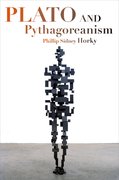I’ve got a game for you to play, but you’ll have to bear with me until the end. I’ll be presenting a paper at the Institute of Classical Studies in London in the Ancient Philosophy Seminar next week on 28 January (Room 243 at the Senate House, Malet Street, London, WC1E 7HU), and I’m feverishly trying to wade through the mushy snow to get to the office and write this one up! Who wants to help?
The talk, entitled ‘Aristotle on Pythagorean Number-Substance’, represents a sustained defense of Fragment 6 of the Pythagorean Philolaus of Croton, whose authenticity Luc Brisson recently challenged at a talk I gave in Paris. It occurred to me that I haven’t really seen anyone do a comprehensive analysis of Aristotle’s Fragment 203 Rose, which – or so I will argue – preserves several references to Philolaus’ work. Alexander of Aphrodisias seems to get this precious information from a lost work of Aristotle’s called On the Opinions of the Pythagoreans, probably a treatise not totally unlike Theophrastus’ doxographical On the Opinions of the Natural Scientists (if that is what it was called). For fun (not so much), and by way of preview, I’ll give my translation and the Greek text of Alexander which will be the focus of this presentation (in Metaph. p. 40.7-24 Hayduck):
The bodies that move the greatest distance to move [the Pythagoreans thought to be] the fastest, those that move the least distance to be slowest, and the intermediate bodies to move in proportion to the size of their orbit. Indeed, on the basis of these likenesses in beings with regard to numbers and things, they supposed that beings are both composed out of numbers and are particular numbers.
And thinking that numbers are prior to nature as a whole as well as to beings in nature (for, they thought, it is not possible for any being either to be or to be known at all without number, whereas it is possible for numbers to be known even without other things), they assumed that the elements of numbers and the first principles of all these [sc. numbers] are the first principles of all beings. These elements were, as has been said [?], even and odd, of which they thought the odd to be limited and the even unlimited; of numbers, they thought the unit to be the first principle, being composed out of the unlimited and the limited; for the unit was at once even-odd, which he [?] demonstrated by way of the unit’s being generative of both the odd and the even number. For the unit added to an even generates an odd, and the unit added to an odd generates an even.
And assuming as obvious from the first likenesses between numbers and harmonic combinations, on the one hand, and the attributes and parts of heaven, on the other, they demonstrated that the heavens are composed out of and in accordance with harmony.
κινεῖσθαι δὲ τάχιστα μὲν τὰ τό μέγιστον διάστημα κινούμενα, βραδύτατα δὲ τὰ τὸ ἐλάχιστον, τὰ δὲ μεταξὺ κατὰ τὴν ἀναλογίαν τοῦ μεγέθους τῆςπεριφορᾶς. ἐκ δὴ τούτων τῶν ὁμοιοτήτων ἐν τοῖς οὖσι πρὸς τοὺς ἀριθμοὺς τὰ μὲν πράγματα καὶ τὰ ὄντα ἐξ ἀριθμῶν τε συγκεῖσθαι καὶ ἀριθμούς τινας εἶναι ὑπελάμβανον.
τοὺς δὲ ἀριθμοὺς ἡγούμενοι πάσης τῆς φύσεως καὶ τῶν φύσει ὄντωνπρώτους (μήτε γὰρ δύνασθαί τι τῶν ὄντων χωρὶς ἀριθμοῦ εἶναι μήτεγνωρίζεσθαι ὅλως, τοὺς δὲ ἀριθμοὺς καὶ χωρὶς τῶν ἄλλων γιγνώσεσθαι)τὰ τῶν ἀριθμῶν στοιχεῖα καὶ τὰς ἀρχὰς τούτων πάντων τῶν ὄντωνἀρχὰς ἔθεντο. ταῦτα δὲ ἦν, ὡς εἴρηται, ἄρτιον καὶ περιττόν, ὧν τὸ μὲν περιττὸν πεπερασμένον τὸ δὲ ἄρτιον ἄπειρον ἡγοῦντο εἶναι˙ τῶν δὲ ἀριθμῶν τὴν μονάδα ἀρχὴν εἶναι, συγκειμένην ἔκ τε τοῦ ἀρτίου καὶ περιττοῦ˙ εἶναι γὰρ τὴν μονάδα ἅμα ἀρτιοπέριττον, ὃ ἐδείκνυε διὰ τοῦ γεννητικὴν αὐτὴν εἶναι καὶ τοῦ περιττοῦ καὶ τοῦ ἀρτίου ἀριθμοῦ˙ ἀρτίῳ μὲν γὰρ προστιθεμένη περιττὸν γεννᾷ, περιττῷ δὲ ἄρτιον.
καὶ ὅσα μὲν εἶχον ὁμολογούμενα ἔν τε τοῖς ἀριθμοῖς καὶ τοῖς κατὰ τὰς ἁρμονίας συνθέσεσι πρὸς τὰ τοῦ οὐρανοῦ πάθη τε καὶ μέρη, ταῦτα μὲν αὐτόθι ὡς φανερὰ λαμβάνοντες ἐδείκνουν τὸν οὐρανὀν ἐξ ἀριθμῶν τε συγκεῖσθαι καὶ καθ’ἁρμονίαν.
Let’s play a game, then. Can anyone identify specifically (a) which portions come from Aristotle’s De Caelo and Metaphysics, and (b) which definitely refer to (i.e. summarize) Philolaus’ fragments? Help me out!

